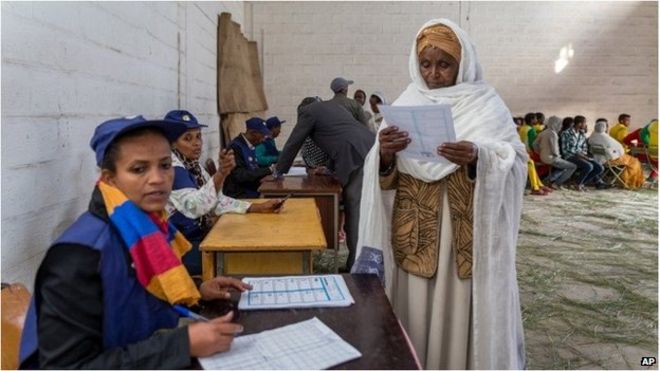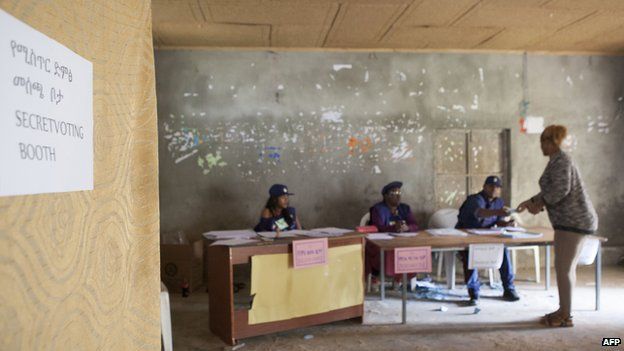By Diida Borbor

The Eastern Industry Zone in Dukem, about 37 km from Addis Ababa, is home to about 20 Chinese-invested manufacturing companies employing thousands of local workers. Photos by Chen Weihua / China Daily
Geographically speaking, Uyghur live in the Xinjiang region, which is located on the north western rim of China. They are overwhelmingly Muslim (Sunni). Relatively speaking, like Oromia, Xinjiang is a resource-rich region.
Just to give some historical context, Xinjiang was conquered by China in 1750s and since then the relationship between Uyghur and Han (ethnic Chinese) was in conflict. Ever since, there have been various uprisings against Han expansions, repressions, and massacres.
Although during the “Five-Peoples Republic” (Mongol, Manchu, Muslim, Han, and Tibetans) era (1911 to 49), China officially recognized over 50 ethnic minorities of which 10 were Muslim nationalities, Muslims continued to be targeted as enemies of socialism (especially, this was the case during the so-called “Cultural Revolution”).
Fast forward to 1949 – China took total control of Xinjiang and what followed was the resettlement of large military personnel, Han farmers and businessmen as well as their relatives. With the support of the Chinese government, the settlers have been able to quickly dominate Xinjiang’s economic sectors — from ma-and-pa business to farming to mining industries. As a result, this large influx of Han has radically reshaped Uyghur’s homeland – Xinjiang. Furthermore, the Chinese put in place draconian measures such as:
- Uyghur language status was downgraded, declaring it unfit for the 21st century.
- State-approved Koran is forced on Muslims.
- Mosques are managed by the government.
- Uyghur men who want government jobs have been forced to shave their beards.
- Women are forbidden to wear hijab.
So it comes as no surprise that there were several open protests that were followed by bloody suppression by Chinese government. One such recent conflict was the
July 5, 2009, in which hundreds of Uyghur were killed, arrested, and jailed by the Chinese government. Since then, from time to time, Uyghur were in the news and the official news coming from China refers tocampaign against “extremism”, “separatism” and “terrorism”. These are exactly the same terms the Ethiopian government uses to justify its barbaric actions against Oromo. Just like Uyghur, Oromo nationals have been detained, arrested, sentenced, and even executed for alleged “separatist” or “terrorist” activities. Furthermore, just like Uyghur, Oromo who were exiled in neighboring countries have been arrested and deported back. Just like in Xinjiang, Oromo land continues to be distributed to settlers / investors.
According to the1953 census Uyghur were about 75 percent of the total population of Xinjiang, while Han were 6 percent (the rest are Huis, Kazakhs and Mongols). But today, thanks to large-scale resettlements, Han have tilted the scale, in a big way. In this way, between 1949 and 2012, Han population in Xinjiang went from 6 to over 50 percent. In certain areas, Han population has risen to over 80 percent. That is exactly what TPLF is trying to replicate in Oromia and they have succeeded in certain cities and regions (just look at Iluu Abbabooraa). Simply put, just like Uyghur, Oromos are becoming minority in their own ancestral land, unless some drastic measures are taken to reverse the trend. It’s is a swim or sink proposition for Oromos.
To accomplish such draconian measures, the TPLF junta is trained and supported by the Chinese ruling party. So, TPLF is getting firsthand experience on how the peoples of Tibet and Uyghur were robbed of their land. The designation of certain cities as federal entities, evictions in the name of development, arming and helping ethnic minorities to drive away Oromos from their ancestral land (in Harar, Baale, Booran), the Master Plan for Shaggar and the recent attempt to indoctrinate Oromo artists and students are part and parcel of the grand design – the Uyghur-ization of Oromia.
So, for all its intent and purposes, Oromia is a resource colony of TPLF and TPLF controls all regions of Oromia. Even the bogus federal arrangement could not camouflage this reality. That is why Oromo and others are evicted from their land in the name of industrialization and development. The question is who benefits from such scheme? Who are getting filthy rich in Oromia? The result speaks for itself. We all know that the Ethiopian government doesn’t care much about economic development in Oromia region. As a matter of fact, the Ethiopian government has done everything to deprive Oromo of any element of power – economic and political. The government cares only about total control over Oromia.
Similarly, just like Uyghur in China, Oromos also have no access to the Ethiopian state economy, which includes state corporations such as Effort and other commercial businesses and service industries. Culturally speaking, as most Oromos do not speak Amharic, it’s hard for them to even get a job in this Amhara-Tigre confederacy dominated economy and polity. While Tigre, non-Oromo and foreign investors are lured by the Ethiopian government to come to Oromia with the promise of land owned by Ethiopian government, Oromos are becoming landless and fleeing from their ancestral land. This is not about Menilik times; it’s still going on at accelerated speed.
It is really ironic to see that while Amhara, Tigre, Harari and Gurage come to Oromia for land grab to get rich, Oromos are becoming refugees in the West to make a living (at least those who survive the Red Sea and Mediterranean death trap). With the exception of the likes of Minaase Wolde Giorgis, who serve as a kind of colonial overseers for the privilege to scavenge over the crumbs that fall from the Tigrean table, all Oromo get is environmental degradation, systematic economic marginalization, victimization, humiliation, repression, large scale eviction, imprisonment, torture, extrajudicial killings, exile and untold misery and suffering.
However, in sharp contrast to Uyghur, Oromo represent over 50% of Ethiopia’s population, which is estimated to be 98 million. As well, most of the arable land, coffee plantation, mining and livestock industry are mainly from Oromia region. On the other hand, Han represent about 90% of China’s1.4 billion people, while Uyghur population is estimated to be about 14 million.
Hence, in relative and absolute terms, Oromo and Ethiopia and Uyghur and China are totally different.
Given these differences, although the younger Oromo generation is injecting life into Oromo national struggle, the organized resistance against Amhara -Tigre confederacy has been unsatisfactory and substandard to say the least. Therefore, the recent sham election and its associated repression, savagery, imprisonment, thrashing of Oromo candidates and their supporters in every part of Oromia was alarming and revealing.
On one hand, it was revealing because it proved beyond any shadow of a doubt that Imperial Ethiopia cannot be democratized and that freedom, democracy, and the rule of law cannot be expected to take root there (I’m not taking a jab at any one, this is my gut feeling). In this regard, I give credit to OFC for clearly exposing and showing us the true colour of the TPLF and their surrogates. Moreover, it proved to us that we are dealing with an authoritarian regime that won’t even have the appearance or facade of democracy.
On the other hand, what was equally alarming and revealing was also the absence of any spontaneous and spur-of-the moment reaction on the part of Oromos towards such heinous and atrocious crimes committed against them. Just one such example was when Baqqalaa Garbaa was physically attacked, on two occasions, by certain thugs, in front of Oromo onlookers, not a sole instinctively or impulsively reacted in his defence. And, such barbaric acts continue unabated even after the fraudulent election in which they claimed to have won 100%.
Sadly, in their own God given land, Oromos are insulted, thrashed, imprisoned and killed 24/7/365 and no consequences for such evil crimes. Consequently, the absence of any reaction on the part of Oromo continues to embolden and brazen our enemies and their lapdogs – OPDOs. That’s why TPLF and their lackeys continue to antagonize and thrash Oromo at every turn.
Given the gallantry, bravery and heroism of our forefathers, such humiliation at the hands of our enemies is unacceptable and deplorable. I cannot comprehend the psychology of waiting cowardly, sheepishly, coyly and timidly for the turn to be blustered, bullied, evicted, thrashed, humiliated, imprisoned and killed. For how long are we going to be dishonoured, disgraced, shamed and humiliated like this and for how long are we going to be at the receiving end of suchegregious human rights violations. When are we going to fight back saying enough is enough?
Oromia Shall Be Free!
Diida Borbor
 The people of Oromo have a n extensive and very rich culture and tradition wh ich have been accumulated for centuries and have been h anded down from generation to generation as a source of pride of the people. The culture of the people is deeply rooted in the Gada system which is a democratic political, economic and social system. The Gada system is a democratic system th at has been shaping and guiding the lives, mode of governance, socio-economic conditions, philosophical outlooks, etc., and which has enabled to ensure unity and solidarity of among the people as well as the practice of peaceful conflict resolution strategies.
The people of Oromo have a n extensive and very rich culture and tradition wh ich have been accumulated for centuries and have been h anded down from generation to generation as a source of pride of the people. The culture of the people is deeply rooted in the Gada system which is a democratic political, economic and social system. The Gada system is a democratic system th at has been shaping and guiding the lives, mode of governance, socio-economic conditions, philosophical outlooks, etc., and which has enabled to ensure unity and solidarity of among the people as well as the practice of peaceful conflict resolution strategies.














